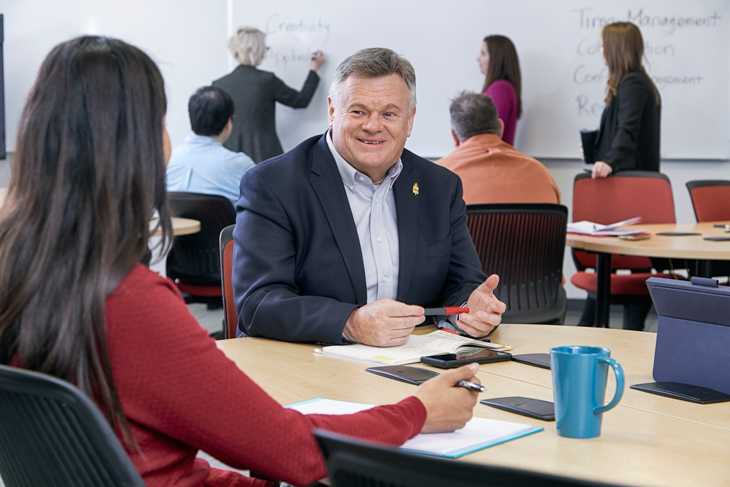Overview
Trauma emergencies demand responders who can assess quickly, think clearly, and act with confidence. ITLS Basic Provider builds on your foundational EMR training and prepares you to provide safe, effective initial trauma care in prehospital settings.
As the second required course in SAIT’s Emergency Medical Responder (EMR) certificate program, this intensive in-person two-day course strengthens your ability to recognize, assess, and manage a wide range of traumatic injuries. Guided by experienced ITLS-certified instructors, you’ll learn the ITLS systematic approach to trauma care and practice the hands-on skills needed for rapid assessment, resuscitation, stabilization, and preparation for transport.
This training is valuable not only for EMR students but also for first responders, rural or volunteer responders, industrial safety personnel, and allied health professionals who may provide initial care before advanced support arrives.
To support your in-class learning, you'll complete required self-paced prep work in the weeks leading up to the first class. Using the ITLS textbook and an online pre-test, you’ll build the foundational knowledge needed to participate fully in the in-person sessions.
By the end of the course, you’ll be ready to integrate ITLS principles into real-world trauma response: able to assess rapidly, identify life threats, prioritize care, and perform key interventions within your scope.
This course is ideal if you:
- respond to emergencies in fire, police, rescue, or industrial settings
- work or volunteer in rural or remote areas where advanced care may be delayed
- are an EMR, first responder, or allied health professional who assists with trauma care
- want to strengthen trauma assessment and decision-making skills in prehospital environments.
- You must complete EMRG 007 Emergency Medical Response: Core to Advanced before registering for this course.
- We will also accept completion of an ACoP-approved Emergency Medical Responder program from another training provider. Or, if you are a First Responder, EMR, EMT, or an allied health professional with suitable qualifications, you may also be eligible. Documented proof is required. Contact ConEdAdvising@sait.ca for more information.
Upon successful completion of this course, you'll be able to:
- describe the five steps involved in scene “size-up”
- describe the assessment and initial management of a trauma patient
- demonstrate patient assessment and management skills
- perform basic interventions for airway management
- manage patients with trauma to the head and brain, thorax and abdomen
- manage patients experiencing shock due to trauma
- manage patients with trauma to the spine and extremities
- manage patients with burns
- manage special population patients with trauma
- manage patients experiencing traumatic cardiopulmonary arrest.
To request a course outline, contact ConEdAdvising@sait.ca.
ITLS (International Trauma Life Support) certification is a globally recognized credential for healthcare and emergency professionals that provides standardized training on how to assess and manage trauma patients in pre-hospital settings. Upon successful completion of this course, you’ll receive ITLS certification, which is valid for three years.
To work as a designated EMR professional in Alberta, you must register with the Alberta College of Paramedics and hold an active practice permit. This requires submitting a registration application and successfully passing the COPR (Canadian Organization of Paramedic Regulators) examination within one year of finishing your SAIT certificate program.
Upcoming dates
Select an available section and add it to your cart. When you're ready, proceed to check out to sign into your student account and complete your registration.
Don't have a student account? Let's set one up!
Registration closes seven days before the start date for on-campus, online scheduled, and blended courses, and one day before the start date for online self-paced courses. We strongly recommend that you register for this course at least 14 days before the start date.
Note: The dates shown below reflect the two in-person on-campus days. You must prepare, ideally two to four weeks in advance, by reviewing the required textbook and completing an online pre-test in Brightspace (D2L). Pre-test access is provided one week before the first class.
After you've completed this course
Upon successful completion of this course, you'll be able to self-print a proof of completion document from your Continuing Education student account.
Costs
Textbooks and reading list
Included in the purchase of this course, you'll receive:
- Access to online course content in Brightspace (D2L)
- Additional course materials/supplies distributed in class
You are required to purchase the following textbook from the SAIT Bookstore website:
- Campbell, J. E., & Alson, R. O. (Eds.). International Trauma Life Support for Emergency Care Providers. (9th ed.). Toronto, ON: Pearson.
Technology
To be successful in this course, you’ll need:
- Access to your own computer or laptop with standard hardware/software requirements
- Internet access
Note: Bringing your laptop to class is not required.
Additional supplies
You’ll need to bring the following personal items starting the first day of class:
- CSA-approved safety glasses
- Stethoscope
Financial support
Financial opportunities are available to help pay for your course fees. Learn more about how to reduce your education or training costs with available awards, bursaries, loans and grants, including the Canada Alberta Productivity Grant.
Applicable certificates
This course applies to the following certificate programs:

Train your team
Interested in group training opportunities for this course? Tell us about your organization's needs, and one of our training consultants will contact you within one business day.
Stories and news

Alberta companies look to workforce training to close critical skills gaps
The Southern Alberta Institute of Technology (SAIT) provides corporate training to help businesses boost productivity and workplace performance.

Donor created space enables cybersecurity training for students and industry
The new SAIT Cyber Range creates an immersive cybersecurity training facility for students and industry in downtown Calgary.

Oki, Âba wathtech, Danit'ada, Tawnshi, Hello.
SAIT is located on the traditional territories of the Niitsitapi (Blackfoot) and the people of Treaty 7 which includes the Siksika, the Piikani, the Kainai, the Tsuut’ina and the Îyârhe Nakoda of Bearspaw, Chiniki and Goodstoney.
We are situated in an area the Blackfoot tribes traditionally called Moh’kinsstis, where the Bow River meets the Elbow River. We now call it the city of Calgary, which is also home to the Métis Nation of Alberta.